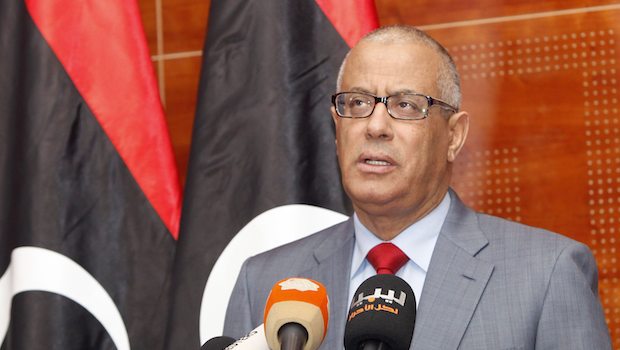
Libya’s Prime Minister Ali Zeidan speaks during a news conference in Tripoli on February 7, 2014. (REUTERS/Ismail Zitouny)
Cairo, Asharq Al-Awsat</em—Unidentified gunmen clashed with military personnel in the Libyan capital on Friday after they attempted to storm the military headquarters in Tripoli—on the same day large demonstrations were expected across the country to protest against parliament’s refusal to disband.
The official mandate for Libya’s parliament, the General National Congress (GNC), came to an end on Friday, with public calls for parliament to adhere to this deadline despite the GNC unilaterally extending its own mandate past the February 7 deadline earlier this week. The GNC took the decision to extend its parliamentary term until a special committee could draft a new constitution. It said this represented an important step in securing Libya’s path to democracy.
No casualties from the clashes were reported, but Libyan military sources confirmed the gunmen had stolen some Kalashnikov rifles and at least four cars.
In a press conference following the decision to extend the parliamentary mandate, GNC President Nouri Abusahmain said: “The GNC received power from the National Transitional Council in a peaceful manner, and we will handover this power in a peaceful manner.”
He added: “The GNC is well aware of its great responsibility, given that it is the highest authority in the country, and it will hand over power to the next authority in a peaceful manner via a transparent and fair election process.”
Libya’s interim government, led by Prime Minister Ali Zeidan, held a meeting on Thursday to discuss the deteriorating security situation in the country, but did not comment on the nationwide protests that have been called for Friday.
But one of Libya’s largest political entities, Mahmoud Jibril’s National Forces Alliance, rejected the parliamentary extension and pledged to withdraw from the GNC despite the extended mandate. In an official statement issued on Wednesday, the National Forces Alliance said: “The GNC will mean nothing to us after February 7,” and accused the Muslim Brotherhood and the Al-Wafa bloc of taking intransigent positions in parliamentary negations.
It added: “We tried to reach an agreement with all the political forces in the country on a national salvation plan, but we were confronted with intransigence and inflexibility of parties who prefer Libya go from bad to worse.”
In comments to Asharq Al-Awsat earlier this week, GNC spokesman Omar Humeidan said: “The National Forces Alliance does not possess the legal mechanisms to implement its decision to withdraw from parliament.”
“GNC members are facing significant challenges and the National Forces Alliance does not have the membership to make such sovereign decisions. The GNC has issued a decision banning political parties and blocs from enforcing their decisions on GNC members and preventing party leaderships from enforcing the decisions of its members,” he said.
“There is no National Forces Alliance coalition in the GNC. This is formed of eight different political blocs. There is no ‘coalition,’ there are only alliances between different GNC members.”
